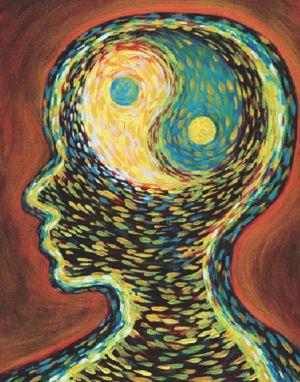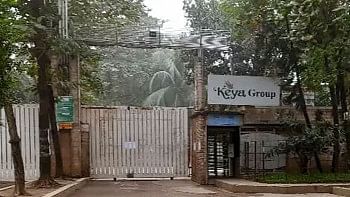Jibanananda On The Streets of Dhaka

Every day, countless strange people are seen wandering about on the streets of Dhaka.
Just the day before yesterday, a scrawny, dark man was walking along the road beside Jagannath University. He seemed confused. A dirty, shabby panjabi with a dirtier dhoti and a pair of very old fashioned sandals was all he wore. There was something peculiar about him. In this southernmost part of Dhaka-2014, somehow he made you think of the 20th century. The way he walked or looked, his attire, everything about him was irrevocably reminiscent of that century.
Could no one recognize him? Though gloom and sorrow streaked his face, he was none other than Jibanananda Das. Quite a long while ago, he had written about a jungle in Libya in one of his poems. He heard that multitudes of bombings, killings and plundering had really turned Libya into a vast and ferocious jungle. So he wanted to see the place for himself. But upon arrival, he realized that those fraudulent touts in charge of his travel arrangements, had brought him to Dhaka instead of Libya.
Walking by Jagannath University, he recalled that somewhere along here he had been married to Labonno Das. But he could not quite recognize the place. He passed by a group of carriages and their skin-and-bones horses. At a place called Patuatuli, he saw a gigantic Sumona Clinic. He thought of going into the clinic to check if he was diabetic. Then, seeing a signboard for 'The Brahmo Society Temple', he relented. Although the locked gate barred him from going in, the thought that the place where he had taken the sacred pledge of marriage had not been eradicated from the face of this earth gave him a vague feeling of peace.
He couldn't think any further on an empty stomach. Finding a vacant taxi, he got into it.
“Take me to a decent restaurant,” he told the driver.
After some hours of being stuck in traffic, the taxi dropped him on the corner of the Press Club.
“Sir, that's the 'Dhansiri' hotel. A very good hotel from Barisal,” the driver told him.
Approaching the place, he noticed that it was indeed named 'The Dhansiri Restaurant'. The signpost in front welcomed: Come folks, have a meal of Balam rice from Jibanananda's Barisal. So, Jibanananda was being used in advertisements these days! He found that he had lost his appetite.
Backtracking, he halted in front of the Bangla Academy gate. He saw a banner. It read: 'We mourn the death of lifelong researcher of Jibanananda Das, Abdul Mannan Syed.' Alas! The man had died just some days ago. If he was alive, the outcome of his research could have been looked into, he thought with regret.
Going past Bangla Academy, he came to a food court called DUS at the TSC. He ordered a lassi. As he sipped it, a voice wafted into his ears, “Banalata Sen looked up...where have you been all these days?” He felt nostalgic hearing the name Banalata after such a long time. Where was Banalata now? Where were those lost days?
He finished his lassi and took a rickshaw to Shahbag. He saw numerous pharmacies and a newsstand at the front. He picked up a newspaper. There was a four-page supplementary on the topic: Jibanananda, a virtuoso in prose. One writer commented, “Novels like Jibanananda's Malyaban, Jolpaihati have changed the course of Bangla prose writing style.”
Was that so? If he had known, he wouldn't have locked all those scripts in a trunk. His reverie broke as the salesman scolded, “Oh Bhai! Why are you going through the papers unnecessarily if you won't take anything?”
He put the supplementary back in its place and walked on to Aziz Super Market. At one bookshop named 'Prothoma', a book - among the variety of books displayed on the glass shelves, caught his eye: Ananno Jibanananda (Jibanananda: A Poet Apart). He couldn't help feeling a little curious about the book. He picked up the book. Turning the cover page, he saw that the principal author was Clinton B. Silly and the Bangla translator Faruq Mainuddin. It was a weighty tome. A glimpse through the introduction told him that a writer from USA has written it after lots of research. Unable to help himself, his eyes welled up. People like Shajanikanto had disregarded him when he was alive, but now he was being studied in faraway countries! He wiped his eyes and walked out of the shop.
Climbing up to the second floor, he saw a bunch of young men chatting in front of a bookshop named 'Banglar Mukh'.
One of them said, “Let's publish a magazine titled Adbhut Adhar.”
Another agreed with him, “A perfect title. Jibanananda was one of a kind. How accurately he had postulated the present era in those words – Adbhut Adhar. ”
Jibanananda decided to move up one more flight of stairs. At the third floor, he beheld rows of clothing stores. Seeing a shop named 'Uter Griba', he went into it. There was nothing quiet and peaceful here, nothing similar to the long neck of a camel, peacefully surveying the horizon. The crowd barely let you stand upright. Adolescent boys and girls had come to buy ethnic clothes for the upcoming Bangla New Year. On the fringe of one sari, written in a silvery stroke was a quote from his poem, 'Oh Kite! Oh golden winged Kite…'
Jibanananda chuckled. The kite that had captured his imagination in some long past afternoon was now fluttering around Aziz Super Market of Dhaka!
Exiting from Aziz Market, Jiban babu saw the group of would-be magazine publishers again. He heard one say, “Let's go to the Bengal Gallery. Bhoomendra Guha is going to give a speech on Jibanananda today.”
What were they talking about? Bhoomen, who nursed him tirelessly during the end days of his life! Bhoomen was still alive? He decided to follow them. At Dhanmondi, road 27, he saw them going into the Bengal Gallery Café.
But Jibanananda stopped, hearing the name 'Labonno' float out to him. The audience was asking Bhoomendra questions about Labonno. The same Labonno who had thought him to be a worthless person! If she heard today that she was being named in relation to her worthless husband, how delighted she would have finally been!
Jibananando thought of meeting Bhoomendra but then rejected the idea. What was the point of awakening an age-old pain, latent deep inside his heart? Walking away, he thought how nice it would be to breathe in the fresh air of Barisal.
Barisal.
Bogra Road.
Sharbananda Bhaban.
He stopped a pedestrian for directions and was told that the buses to Barisal started from Gabtoli. He got into a bus named 'Dhusar Pandulipi Paribahan' to go to Gabtoli. A girl sat beside him on the bus. She looked a lot like Manjusree.
Suddenly a song rang out from her purse:
Bishho kobir sonar Bangla,
Nazrul er Bangladesh,
Jibananander ruposhi Bangla,
Ruper je tar neiko sesh,
Bangladesh.
The aureate Bengal of Rabindranath,
The Bangladesh of Nazrul,
The graceful, charming Bengal of Jibananando,
Whose beauty is incomparable.
Bangladesh.
Great! So he was also in ringtones! When she finished talking on the phone, he asked her what her name was.
“Arunima,” she replied.
Could she be the Arunima Sanyal? The girl started to talk about herself. She was a student of Bangla Literature at B.M. College in Barisal. She had come to Dhaka University for her M. Phil admission. When asked what topic she was going to do her M. Phil in, she answered, “The Seamanship of Jibanananda.”
“Why did you choose such a dry and difficult topic among so many others?” he asked.
“You won't understand.” The girl answered with a derisive smile. “First read Jibanananda thoroughly, then you will see. He wasn't a poet at all. He was a tragic sea-mariner. Whether in Malay or Singhol, no matter how many ships he traversed on, he couldn't decide which port to land on. Neither in life, nor in love. So he dived on the corner of Deshpriyo Park, from the water straight to the dry, rough, solid green onshore.”
Jibananda shuffled uncomfortably. What was she saying? She was so close to understanding him! Unable to contain his curiosity, he asked Arunima, “Can you tell me the reason behind Jibanananda's fate?”
The girl responded wisely. “Do you know a disease named Biponno Bishshoy? The interesting thing is Jibanananda Das himself was the inventor of this disease and he ailed from it too.”
Jibanananda couldn't take it anymore. He became speechless. He closed his eyes as though seeking salvation from this insufferable truth.
But Arunima didn't let him be. She gave him a little push and said, “I see you are suffering from this Biponno Bishshoy too. Come, Gabtoli is almost near.”


 For all latest news, follow The Daily Star's Google News channel.
For all latest news, follow The Daily Star's Google News channel. 



Comments